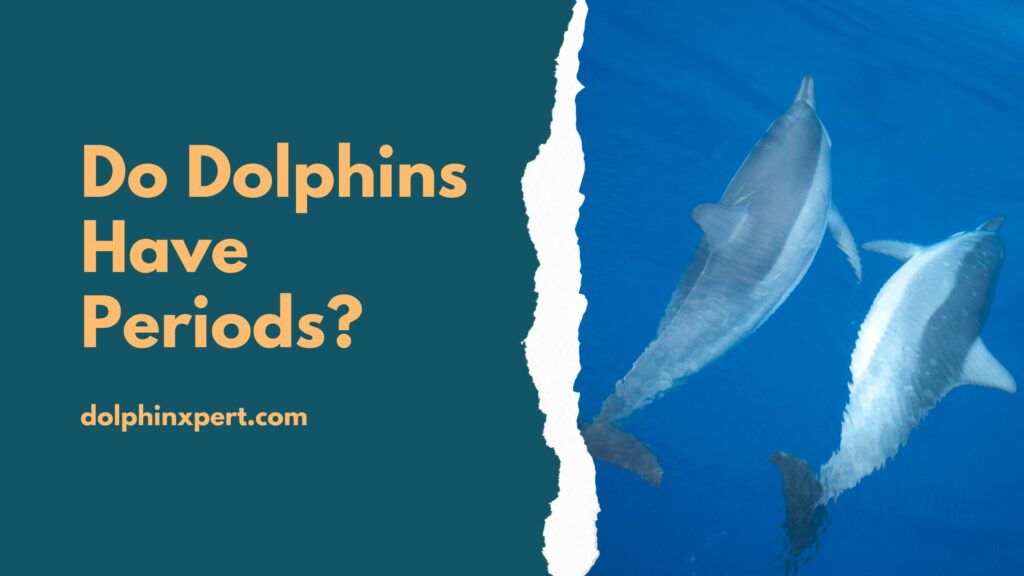
Dolphins, known for their intelligent and playful nature, have always fascinated humans. One of the curious questions that comes to mind is “do dolphins have periods”, similar to humans.
In this article, we will investigate into this topic and explore the different aspects surrounding the reproductive cycles of these remarkable marine beings.
Table of Contents
Do Dolphins Have Periods?
The short answer to the question is no; dolphins do not have periods in the same way that humans do.
Menstruation is the shedding of the lining of the uterus (endometrium) each month if pregnancy does not occur. This is accompanied by vaginal bleeding.
Dolphins, like other whales, have a different reproductive system than most mammals. They do not have a menstrual cycle.
Instead, dolphins have an estrous cycle, which means that they are only receptive to mating during certain times of the year.
During this time, they ovulate and release eggs. If an egg is fertilized by a sperm, it will implant in the uterus and develop into a calf. If the egg is not fertilized, it is reabsorbed by the body.
Dolphins can ovulate multiple times per year, and their estrous cycle length varies depending on the species. Bottlenose dolphins, for example, ovulate 2-7 times per year with a cycle length of about 30 days.
Even if a dolphin does not ovulate, she may still experience some vaginal bleeding. This can happen for a variety of reasons, such as infection, injury, or hormonal imbalances. However, it is important to note that vaginal bleeding in dolphins is not the same as menstruation.
Scientists are still learning about the reproductive biology of dolphins, but it is clear that they have a unique system that is different from most other mammals.
Do Dolphins Have Periods and Bleed?
Unlike humans, dolphins do not bleed during their reproductive cycles.
Menstruation in humans involves the shedding of the uterine lining, resulting in bleeding that typically lasts several days.
This process is linked to the human reproductive cycle and is a key indicator of fertility. Dolphins, on the other hand, do not experience a similar menstrual cycle.
They do not have a thick uterine lining that needs to be periodically shed, so they do not bleed as part of their reproductive process.
See Also: Do Male Dolphins Have Balls? Testes Underwater
Do Dolphins Have Menstrual Cycles?
While dolphins do not have menstrual cycles in the same sense as humans, they do experience an estrous cycle.
This cycle is similar to the menstrual cycle in terms of the recurring patterns of reproductive activity. During the estrous cycle, female dolphins go through stages of sexual receptivity and fertility.
The estrous cycle of dolphins is regulated by hormones, with the peak period of receptivity known as estrus.
It is during this time that females are most likely to conceive if they mate with a male dolphin. The length of the estrous cycle and the duration of each phase can vary among different dolphin species.
How Do Dolphins Get Pregnant?
Estrus, Not Menstruation
Instead of menstruating, female dolphins undergo a reproductive cycle marked by estrus and ovulation. During estrus, which is akin to a fertile period, female dolphins become sexually receptive and may engage in mating behavior with male dolphins. This is a crucial phase in their reproductive process.

Pregnancy and Live Birth
If mating is successful during estrus, the female dolphin becomes pregnant. The gestation period for dolphins can vary depending on the species but generally lasts around 10 to 12 months. It’s worth noting that dolphins typically give birth to a single calf, although some species may occasionally have twins.
Can Dolphins Sense Periods?
Dolphins do not have a sense of smell, so they cannot sense periods in the same way that some other animals, such as dogs, can.
However, dolphins are highly intelligent and social animals, and they are very sensitive to changes in their environment.
It is possible that they could sense that a woman is on her period by other changes, such as her behavior, scent, or pheromones.
There is no scientific evidence to suggest that dolphins can sense periods, but it is an interesting possibility.
More research is needed to better understand the reproductive biology of dolphins and their social interactions.
In the meantime, it is important to remember that dolphins are wild animals and should be treated with respect.
If you are on your period and are considering swimming with dolphins, it is always best to check with the facility first to see if they have any specific policies or procedures in place.
See Also: Do Dolphins Attack Pregnant Woman? Exploring the Myth
Frequently Asked Questions (FAQs)
Do Dolphins Get Pregnant?
Yes, dolphins do get pregnant. They have internal fertilization, and the female dolphin carries the developing fetus within her body until birth.
How Long Is A Dolphin’s Gestation Period?
The gestation period of dolphins varies depending on the species. Generally, it ranges from 9 to 17 months, with most species having a gestation period of around 12 months.
Are Dolphins Monogamous?
Dolphins, in general, are not monogamous. They often engage in multiple mating partners throughout their lives. However, some species have been observed to form long-term pair bonds.
Do Dolphins Have A Reproductive Cycle?
Yes, dolphins have reproductive cycles regulated by hormonal changes, but they do not have menstrual cycles like humans.
Do Dolphins Have A Reproductive Cycle?
Yes, dolphins have reproductive cycles regulated by hormonal changes, but they do not have menstrual cycles like humans.
Are There Any Other Marine Mammals That Have Periods?
Most marine mammals, including whales and seals, do not have menstrual cycles like humans. They have their own unique reproductive processes.
Conclusion
While dolphins do not have periods in the same manner as humans, they undergo reproductive cycles that involve similar patterns of fertility and receptivity.
Understanding the complicacy of dolphin reproduction enhances our knowledge about these remarkable creatures and highlights the diversity of reproductive processes in the animal kingdom.
By exploring the mysteries surrounding dolphins’ reproductive cycles, we gain a deeper appreciation for their unique nature and the wonders of the natural world.

Mr. Das, a certified pharmaceutical scientist, holds a Bachelor of Science in Pharmaceutical Sciences and passionately contributes to dolphin conservation as a member of the committee in Bangladesh.


